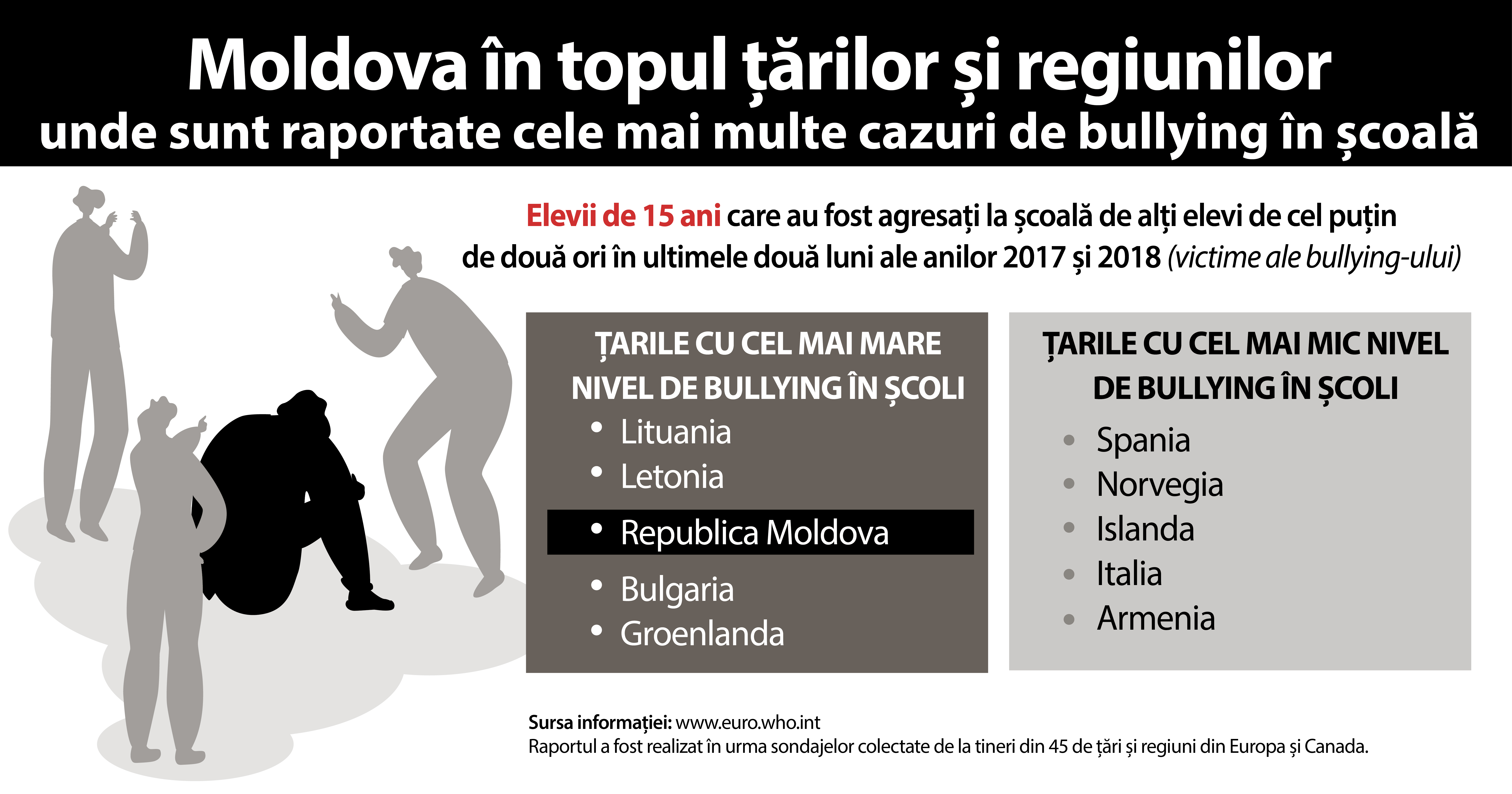back
Bullying violates students' rights to education and health

The phenomenon of bullying (systematic bullying and psychological harassment) is on the rise in schools in our country.
The phenomenon of bullying (systematic bullying and psychological harassment) is on the rise in our country's schools, and students are increasingly reporting that they have witnessed or even been victims of such actions. Data from a recent report published by the World Health Organisation (WHO) Regional Office for Europe shows that Moldova is among the top countries where bullying is prevalent. Educators and experts are calling for the development and implementation of educational programmes to prevent and combat this phenomenon, aimed at pupils, teachers and parents. Violence and bullying in the school environment constitute a violation of children's rights to education and health. Bullying in schools includes a range of violent actions between pupils, manifested through bullying, belittling and harassment. The term 'bullying' comes from the English word 'bully', which means 'bully' or 'bully'. In Romanian this word does not have a full translation, but its meaning can be associated with the terms harassment, intimidation or bullying. Adrian Guranda is a student at the College of Light Industry in Balti. He heard about the concept of bullying only last year during a civic education activity. Adrian is from the village of Corlăteni, Râșcani district, and recognises that in his home village school, as in many other educational institutions in the country, some pupils or groups of pupils are victims of bullying, being discriminated against and harassed. The young man believes that pupils need to know more about this phenomenon, whether they have been "perpetrators" or "victims": "I think the bully-pupil has some problems in the family if they are aggressive towards other children. So he wants to be in the spotlight, to be heard. This is something that needs to be talked about in school, because there is little discussion about it now." Natalia Popov, a teacher of Romanian language and literature at the secondary school in the village of Făleștii Noi, Fălești district, believes that not only pupils but also teachers should be involved in anti-bullying programmes. "Our teachers are not so familiar with this phenomenon, that's why they don't know what methods to apply to intervene and prevent these actions", says the teacher. According to Vasile Bîrca, geography teacher and deputy director for education at the "Ion Creanga" Theoretical High School in the village of Cuizăuca, Rezina district, children's behaviour is influenced by several factors, including the moral health of the family. He has attended several trainings in this field and is convinced that parents should also know what bullying is and how its effects can be mitigated. "It is often not easy to realise that it is bullying, because student-bullies usually have supporters and the actions are systematic. At the same time, pupils who resort to bullying are also victims of certain social circumstances. This is why not only teachers but also parents need to be aware of the characteristics of this phenomenon. Anti-bullying programmes must be drawn up with the participation of pupils, teachers and parents, and the state must also impose certain penalties for bullying". Moldova among top countries in Europe where most cases of bullying at school are reported Data from the WHO Regional Office for Europe's "Adolescent Health and Well-being Report" show that our country ranks among the top European countries with the most cases of bullying at school. Thus, students in Latvia, Lithuania, Republic of Moldova, Ukraine, Bulgaria, Russian Federation, Romania, etc., mentioned that they were bullied at school at least twice in the last two months of 2017-2018. The report was based on surveys collected from more than 220 thousand young people in 45 countries and regions in Europe and Canada. The students surveyed were aged 11, 13 and 15. Another study, the same situation And the conclusions of the study "Bullying among adolescents in the Republic of Moldova", conducted by Sociopolis Consulting Centre with the support of UNICEF Moldova, show that the phenomenon exists in schools in the country and national anti-bullying programs are needed. Adolescents involved in bullying situations as aggressors, victims or witnesses, are more prone to absenteeism, school dropout, have low performance in school subjects. The authors of the study note that the phenomenon also has consequences for students' future: "Bullies or victims of bullying are more susceptible to symptoms of depression and anxiety, have low self-esteem, feel lonely, in some cases lose interest in activities. The emotional and behavioural problems suffered by both victims and bullies can continue into adult life." Bullying banned by law in Romania In Moldova the term bullying is not included in national legislation. However, in Romania, at the end of last year, amendments to the National Education Law came into force, according to which behaviour consisting of psychological violence - bullying - is prohibited in educational establishments and in all places intended for education and vocational training. Romanian lawmakers have provided that people involved in bullying, both aggressors and victims, must receive psychological assistance and assessment. Lilia Zaharia
